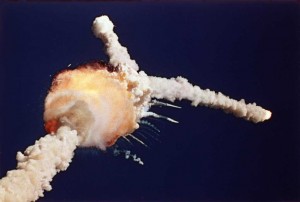I Don’t Believe In That God Either

by Rabbi Efrem Goldberg
Last month marked thirty years since the tragic explosion of the Space Shuttle Challenger. Seven crew members died after the shuttle broke apart 73 seconds after takeoff. As I’m sure is the case with many of you, I vividly remember exactly where I was when this catastrophic event occurred. Along with many American children, my middle school class was listening to a live broadcast of the launch over the class speaker because Christa McAullife, an “ordinary” teacher from New Hampshire was on the shuttle as the first person chosen to participate in NASA’s Teacher in Space Project.
Even as children, when the Challenger exploded we understood that something historically tragic had occurred. We were stunned and searching for a way to understand what we had just heard. Our poor teacher was thrust into an incredibly difficult position with no preparation time or ability to craft a nuanced, sensitive, and meaningful lesson plan.
His words that day were forever seared in my memory because of how much they disturbed me, even at that young age. Without having the chance to process what had just transpired, he turned to us, his students and explained that he thought the Challenger had exploded because man was getting too brazen and encroaching on God’s territory in the heavens. God had struck down the Challenger, he said, because we had violated the boundaries that separate us from Him.
In the town of Berditchev, there was a proud, self-proclaimed atheist who shared with anyone who would listen his problems with a cruel, uncaring God. The great Chassidic Master Rebbe Levi Yitzchak approached him. After the atheist vociferously explained why he doesn’t believe in God, Reb Levi Yitzchak turned to him and said, “You know, the God you don’t believe in, I don’t believe in him either.”
When I heard my teacher describe with full confidence why God blew up the Challenger, I didn’t yet know the story of Reb Levi Yitzchak, but I did intuitively know that I didn’t believe in the God my teacher was describing. Would God really kill seven innocent people in such horrific fashion because they were involved in space exploration? That made no sense to me and I wanted no part of such a God. Looking back, I am tremendously grateful that I didn’t accept his reason and rejected his acting as God’s spokesperson. I rejected it, but it confused me and upset me to the extent that I remember it until this day, thirty years later.
My middle school teacher didn’t have time to formulate his reaction, but sadly, there are rabbis and teachers still today who, with plenty of time and space to prepare, are still presenting themselves as God’s spokespeople, communicating with full confidence the reasons and causes for the world’s catastrophes, natural disasters, and human suffering. One popular outreach rabbi has explicitly claimed in his online classes to know why certain people were killed in the Holocaust and that “blind children are being punished for watching pornography in previous lives” and that “cancer is caused by sin in this life” and “Down syndrome and autism are a result of a sin in a previous life.”
His loyal followers point to his success in attracting students and cite his influence and impact on thousands of people as justification for his method. However, the Torah never measured truth and authenticity by popularity. By that measure, we should have folded to other religions and ways of life long ago.
In next week’s parsha, Moshe pleads to Hashem – hodi’eini na es derachecha, make Your ways known to me so that I know You, so that I may find favor in Your eyes.” Moshe continues, “har’eini na es kevodecha – “Show me now Your glory.” What was Moshe requesting? What was it that he wanted to know?
Even more mysterious is Hashem’s response. “You cannot see my face, for no human can see my face and live… you will see My back, but My face may not be seen.” What is Hashem responding to Moshe?
The Talmud (Berachos 7a) explains that Moshe was requesting from God a window into understanding the meaning and order of the universe. Moshe sought insight into how God runs the world and an understanding of His system of justice. In essence, by asking to see God’s face, Moshe is saying, “God, let me see what you see.” Show me Your perspective of the world and Your system for what happens.
Hashem responds, “Moshe, I cannot show you My face, you cannot see through My eyes, because you are human and you are finite. By definition you are incapable of fully comprehending My system of justice and of appreciating the ultimate meaning and order of the universe. However, you can see the back of My head. Once the event or experience is over, there will come a time, whether in this world or the next, that you will see retroactively why events unfolded the way they did and why ultimately there is meaning and order to everything.”
While this dialogue in particular and the question of why bad things happen to good people requires greater elucidation, one thing is clear from this conversation. We are not empowered or entitled to claim to understand how Hashem runs His world. Indeed, to assert that you know with confidence Hashem’s ways and that you have access to His thinking is an act of heresy.
It is understandable that people who are suffering would try to identify exactly why Hashem is visiting this misery upon them. However, it is an exercise in futility. Our mission is to reflect on our circumstances and be motivated to grow, improve, and find a way to become better as a result. But attempting to uncover exactly why Hashem placed us in the particular position is something unattainable and a poor use of energy and focus.
This week, hundreds of people gathered in Yerushalayim to pay tribute to Dafna Meir Hy”d, who was murdered by a terrorist in her home in Otniel a month ago. Her fifteen-year-old son Akiva spoke and ended by saying:
And now, when everything has been cut down, I stand across from Him, and I am silent. I stand across from the Infinite, and I know that He did this just like He does everything. And suddenly I see a picture that is a little bigger. Bigger than me. Bigger than all of us. Master of the Universe, I want to say one thing to you, just one: Thank You. Despite the difficulty. Thank you for fifteen and a half years of light. Thank You for being with me at the most difficult moments. And that You will be with me during even more difficult moments. And also for all the other miracles which You have performed for me. Thank You. You gave, and You took. May Your name be blessed forever.
“Deracheha darchei noam – The Torah’s ways are pleasant.” Hashem wants us to be uplifted and inspired, not feel dejected and beaten down. He wants us to see others who are suffering and be filled with sympathy and support, not with condemnation and judgment. He wants us to bring our fellow Jews close to Torah with humility and intellectual modesty, not bombastic statements and outrageous proclamations.
Thirty years after the Challenger explosion, I continue to reject my teacher’s explanation and I refuse to believe in His God. While I know he meant well that day, our teacher failed us, his students. I implore you to insist on teachers for your children, and leaders for yourself, who understand and present that Hashem is in charge, we are incapable of having access to His secrets and His ways and that “divrei chachamim b’nachas nishmaim – the words of the wise are most effective when delivered with pleasantness.”
Rabbi Efrem Goldberg is the mora d’asra of the Boca Raton Synagogue.




In the weeks after 9/11, I heard drashos by great Rabbonim; I’m afraid I can’t remember exactly what they said. But I do remember being struck by how different were their approaches to, What should we take away from this tragedy? One said we should take on being more careful about lashon hara. One suggested being more devoted to Torah study. And another, increasing our work on our emunah, on our understanding that Hashem runs everything in the world. (I probably even have the examples wrong.)
I didn’t blame them. None of us are prophets today. We try to learn from things that happen, try to use them to make ourselves better – and try not to fool ourselves that we have the answers.
Without meaning to attack the correct points you made, I wonder: Were you perhaps upset because you don’t agree with his _particular_ takeaway, don’t agree with him that man has no business flying to space, that it’s a kind of insult to Heaven? Would you have been hurt if the teacher had given an explanation that fits with your personal views? Perhaps if he had talked about emunah and bitachon, or lashon hara, you would have had no real problem with it, though he would have been just as unqualified to guess our creator’s intent. (I imagine he didn’t actually speak with “full confidence”, though perhaps it came across that way. As you said, he was unprepared and on the spot.)
The charedi world is not always a simple place, and fine people can have very different opinions on some issues. Sometimes they even go so far as to be sure that Hashem agrees with them! That can grate on others.
Very nice article, and I agree with it. The problem, though, as I’m sure many others will point out, is that our tradition is filled to the brim with disasters far bigger than the Challenger, and no one ever hesitated to ascribe these events to even the smallest infractions of Jewish law. Nor was it only the Prophets and Sages who engaged in such interpretation; we find Rishonim and Achronim doing it regularly, such as (only one of the better known examples) tying the destruction of synagogues to talking in shul. Moreover, even with regard to the Sages, they viewed themselves vis-a-vis the Prophets in the same proportion as we view ourselves today vis-a-vis the Sages – and yet again, the Sages never thought to limit the interpretation of events to only the Prophets before them. To the contrary, they walked in their footsteps and just as the Prophets attributed great political upheavals, like the destruction of the First Temple, to failures in religious observance, the Sages did the same thing with the destruction of the Second Temple and the ascendancy of Rome. And so on and so forth, pretty much right until the dawn of the Enlightenment/Haskallah. We may be very uncomfortable today with attempting to divine the reasons for God’s inscrutable ways, but we cannot deny it is part and parcel of our tradition.
In essence, this issue is a mere sub-set of a much larger issue, which we have still not learned to come to terms with. And that is the glaring contradiction of holding up the figures of Tanach and Chazal as role models for men today, yet simultaneously positing that so much of what they did is off limits to us. This is a well known problem, arising in many areas of Jewish life and study. My sense is that we will never be able to surmount the problem, being something baked into the DNA of our worldview, and not merely excess baggage we picked up in the Exile that can safely be jettisoned as needless surplussage or מנהג טעות. We will have to live with these two contradictory messages, suffering the occasional jostle of discomfort that arise from time to time when the two collide. As an example of such discomfort, this article, and the story told at the beginning, is a perfect example.
Too many feel impelled to grandstand after tragic events. Typically, they try to link the event to their chief pre-existing concerns, and to blame their favorite villains. That’s not to say that all attempts at analysis on our level are futile, but these require an open mind, modesty, and a willingness to accept partial answers as such. There is necessarily a tension between:
1. Our inability to see from HaShem’s point of view, and
2. Our need to draw life lessons from events
The article overstates the case. While it is true that the average individual alive today doesn’t know the reason for specific events, it is similarly true that events do have causes. After all, the gemara has statements such as fires coming as a result of chillul shabbos, the first churban from al shelo birchu batorah techila et al, the second churban from sinas chinam, etc. I would stop with “that person doesn’t know why this event happened,” rather than trying to say that tragedies “can’t be” punishment for offenses.
I agree with Reb Yid: You have overstated the case. Ramchal explains that Hashem’s statement to Moshe does not mean that we cannot understand tzaddik vera lo in a general way; we just can’t understand the specifics: why some tzaddikim suffer and others don’t.
Ramban states that rasha vetov lo is a far more difficult question than tzaddik vetov lo. Among his many explanations for the suffering of generally righteous people, he refers to the concept of reincarnation. In the case of people born to a situation of suffering, any other explanation is hard to fathom. Those who suggest it are not off the wall, and are not pretending to be prophets; they are merely applying our mesorah to the best of their understanding. [This should not be viewed as an indictment to the individuals such statements apply to; Olam Habah may demand a level of perfection that very few reach without some patch-up work, even very, very good people , and Hashem in his kindness gives people a second chance].
I agree that one should not make strident statements about these issues (unless he is truly qualified, with broad and deep mastery of Torah); this is true of any area in Torah, for they are all complex and nuanced. Additionally, any suffering or loss of life must be spoken about with great sensitivity. But that does not mean ignoring our mesorah on understanding suffering, which, when understood correctly, helps us integrate Hashem’s kindness with what suffering we see around us , at least on an intellectual level, if not on an emotional one.
May Hashem bring an end to all suffering speedily in our days!
Thank you for your replies. To clarify, I never suggested that we don’t look at what happens to us in life and seek to grow as a result. Growing and taking on ways to improve is not the same as ascribing direct cause and effect reasons for tragedies and events.
Direct cause and effect is out of the reach of most, but that does not mean we shouldn’t make an attempt to isolate the issues and work on them rather than try the catch-all “we must do teshuvah” approach. This is an explicit Gemara in Brachos that states:
תלמוד בבלי מסכת ברכות דף ה/א
אמר רבא ואיתימא רב חסדא אם רואה אדם שיסורין באין עליו יפשפש במעשיו שנאמר נחפשה דרכינו ונחקורה ונשובה עד ה’ פשפש ולא מצא יתלה בבטול תורה שנאמר אשרי הגבר אשר תיסרנו יה ומתורתך תלמדנו
If you don’t agree with the specific in-your-face approach of a specific rabbi, that’s fine, but that doesn’t mean you can discard or ignore a Gemara which expresses a significant idea that is very much a part of our mesorah.
The proper response to tragedy is that we don’t know. However, we can surmise that any bad event is caused by misbehavior (on an individual level, this is not always true, as there are yesurim shel ahavah. But on a national level it is).
It becomes an issue when we attempt to specify a particular reason why a tragedy occurred. I would not God forbid criticize the Great Ones of the past, or even the Gedolim of today, for doing so, but in general they don’t. What they (the Gedolim that is, not the beinonim who hog headlines) do say is general advice – we must do teshuvah, and perhaps they add a,b, and c that we can do to improve our Mitzvah performance. That should not be misconstrued as “the reason why” a particular tragedy occured.
Theodicy tends to be reductionist logic at its worst-regardless of the proponent. What we can derive from any tragedy is what to do in the future. One can maintain as I have seen mentioned by R Sternbuch and RHS is that we can learn a lot from a tragedy which the investigation determined was caused by a faulty sprocket. Halacha, also , is rooted in detail, and the failure to sweat and appreciate detail can lead to one thinking that a person is observing a particular mitzvah or halacha, when in fact, one is not even fulfulling what is required M Ikar Hadin.